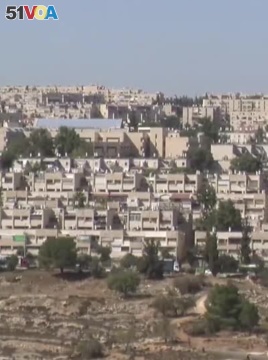October 08,2014
JERUSALEM— The governments of Europe and the United States have criticized Israel for announcing it will build 2,600 new housing units in a sensitive part of East Jerusalem. They believe it hinders efforts to secure a peace accord with the Palestinians. Activists say the new neighborhood would complete a band of Jewish areas separating Jerusalem from nearby Bethlehem.
Midday at Givat Hamatos in southeast Jerusalem.

Twenty years ago Givat Hamatos was a temporary community of new immigrants from Ethiopia and Russia. Most have long gone, leaving about two dozen impoverished households and a lot of empty space.
Israeli Prime Minister Benjamin Netanyahu wants to change that and build 2,600 homes on this land. But it lies on the other side of the so-called “Green Line” demarcation zone and is considered by the international community to be part of the Palestinian West Bank.
Activists like "Peace Now" Director Yariv Openheimer said this hurt efforts to establish a Palestinian state alongside the Israeli state.
“When Netanyahu is saying that he is in favor of a two-state solution, he needs to explain how can he say it while at the same time he continues to approve settlement expansion and expansion of settlements in east Jerusalem," said Openheimer.
The Israeli government also has recognized the settlement of Gva’ot in the Gush Etzion region further south near Bethlehem. It said no one owns this land, but it will allow 45 days for any objections, said Regional Council head, David Perl.
“If someone thinks it is wrong, he can come and do whatever he wants. No one wants to steal a piece of land from Arabs or anyone else. We would be more than happy that they continue to live here. But if there is land that does not belong to them, then we can build communities for us and we are more than happy to do it,” he said.
Israeli officials said anyone could live in these new communities. But critics said very few Arabs have moved into other such neighborhoods. Senior Palestinian official Mohammed Shtayyeh said it was really part of an effort to drive non-Israelis from Jerusalem.
“All what Israel really intends to do is to change the demographic structure of Jerusalem. This is a process of the Judaisation of Jerusalem and this is an affront in the face of all the international efforts to really resume and achieve peace in the region," he said.
Israeli officials say they need new housing for the city’s growing population. Critics said Givat Hamatos would serve primarily to isolate Arab neighborhoods in Jerusalem from the West Bank.